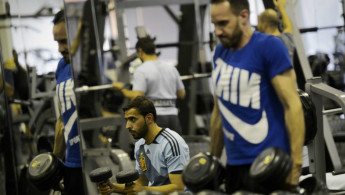Keeping fit during Ramadan: How different people stay healthy over the holy month
One of the main aspects of preparing for Ramadan is to figure out ways to better yourselves and implement them during the holy month.
Carrying out these changes can at times be seen to be more sustainable throughout the year, because Ramadan is a month where a person's discipline and self-control are put to the test not only during fasting, but after the fast has been broken.
For those who want to take Ramadan as an opportunity to cultivate a healthier diet, the discipline may feel like it has just started at the dining table by refusing fried foods or a slice of knafeh.
Finding an exercise routine is even more complicated, because the human body can only take so much strain when fasting and in countries where fasting hours are long, many complain about it being difficult to find some real time to exercise after iftar.
"Having a fitness routine during Ramadan should only be done for people who are used to exercising," personal trainer Charline Campbell tells The New Arab.
She warns that people adding extra pressure on their bodies when they are not used to it is not only counterproductive, but also dangerous.
This does not excuse a sedentary lifestyle during the holy month, but the concept of starting an exercise journey in Ramadan is one that is not recommended and people wanting to remain healthy should focus on nutrition and begin working out after Eid.
 |
|
'Lighter than usual'
For those who already have an exercise routine, cardio is not recommended.
"If a person is used to working out, their workouts should be lighter than usual," Campbell adds.
"It should be limited to four exercises and three sets of each with 10 reps and when fasting, exercise should only be done close to breaking your fast or early morning (before the fast begins)."
What is deemed a light or heavy exercise changes from person to person, so it is important for the fasting person to know when to stop and when to tone down an exercise to prevent injury from bad form out of fatigue and dehydration.
'My body is sacred'
The Islamic belief of the human body is that it has been given to a soul as a responsibility to take care of it, which is one of the most under-discussed reasons that Muslims exercise during Ramadan.
"I believe that Allah has given me this body as an ammanah (object of trust) and it is my duty to take care of it," London-based Shaima tells The New Arab.
This is one of many reasons that she has chosen to sustain an exercise regime during Ramadan for the first time this year.
"For me, health is wealth. I'm in my early-20s and I shouldn't be gasping when I go up a flight of stairs. At the same time, I want to look good. I don't care what society thinks of how I look, as long as I think I look good and I feel healthy, that's all that matters to me."
The concept of a human's body being an ammanah does not only extend to health. Contrary to popular belief, wanting to accentuate a God given beauty is something that is highly endorsed in Islam and it is not mutually exclusive to leading a healthy lifestyle in matters of religion and in matters of general health.
"I don't plan on pushing myself too much, I will do 20 minutes of weights and then 20-40 minutes of light cardio after I finish work, just before iftar," she says, adding the trick for herself is to treat Ramadan like every other month for her exercise routine: "Even though in Ramadan, you should take it easy, it's not special in the sense that life stops – people used to fight wars fasting at the time of the Prophet Muhammed, so it doesn't make sense to become lazy when we can exercise just because we're fasting."
Shaima says she will make sure her nutrition follows suit with her exercise routine during the holy month.
"I won't have a cheat meal, like having KFC or other fast food during Ramadan. I will make sure I avoid samosas and other unhealthy sides we have on the table during Ramadan, but I will be surrounded by traditional sweets."
 |
Even though in Ramadan, you should take it easy, it's not special in the sense that life stops – people used to fight wars fasting at the time of the Prophet Muhammed, so it doesn't make sense to become lazy when we can exercise just because we're fasting |  |
Fasting through a weight-loss journey
Faisal, living in Kuwait, he too will be exercising in Ramadan out of a drive to continue his weight loss journey.
"My journey started out over something really silly, actually – a jacket. A jacket that I wanted to wear really, really badly," he tells The New Arab.
"All my life I've struggled with weight loss and gain but it took something extremely small to get me to take simple steps, at first, towards a better me."
Like Shaima, the fact that he intended to lead a healthier lifestyle for himself rather than out of succumbing to societal pressures is a part of his ability to stay motivated.
"I was doing it for myself rather than others perception of me and in my eyes the only way a life style change sticks is if it comes from a source of self-improvement over social pressure."
Faisal says fasting in Ramadan is an extension of his weight loss journey and the holy month makes weight loss easier for him because of the discipline needed to fast and the inability to eat as much as usual through the night.
"You're already putting yourself under a stricter regimen of sorts – what would feel unfulfilling on a normal day is more than enough after a long fast," he tells The New Arab.
 |
The process is frustrating and teeters on maddening and sometimes you'll question if it's worth it and the answer is a simple yes |  |
Despite this, he still sees a risk of overeating which can at times take even more discipline to say no.
"There is the challenge of combatting the culture of indulgence that surrounds Ramadan – if it can be overcome in Ramadan, it can be a very, very productive month," Faisal explained.
The discipline needed in Ramadan to make it a productive month is one that extends to his general weight loss journey, reminding him that it is possible to say no and to focus on a specific goal even if there is a tub of ice cream waiting for him to indulge after a 15-hour long fast in extreme heat.
"It's not always fun, it's not always rewarding, sometimes punishing; the process is frustrating and teeters on maddening and sometimes you'll question if it's worth it and the answer is a simple yes," says Faisal.
The New Arab's Ramadan Series: Click on our Special Contents tab to read more on Ramadan 2018:
 |


![President Pezeshkian has denounced Israel's attacks on Lebanon [Getty]](/sites/default/files/styles/image_684x385/public/2173482924.jpeg?h=a5f2f23a&itok=q3evVtko)



 Follow the Middle East's top stories in English at The New Arab on Google News
Follow the Middle East's top stories in English at The New Arab on Google News


